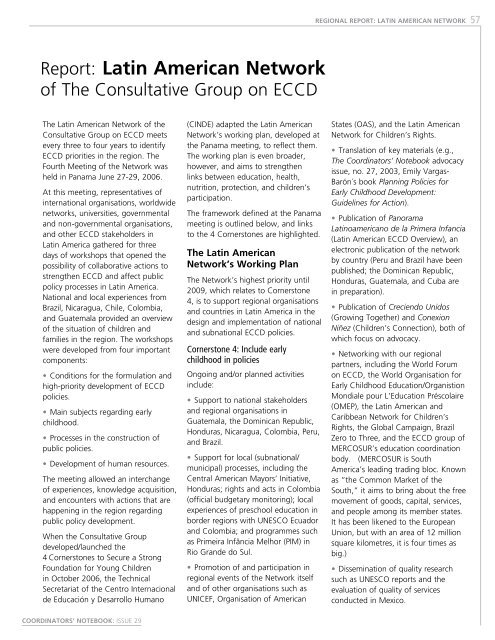A global call to action for early childhood
A global call to action for early childhood
A global call to action for early childhood
You also want an ePaper? Increase the reach of your titles
YUMPU automatically turns print PDFs into web optimized ePapers that Google loves.
REGIONAL REPORT: Latin American NetworK<br />
57<br />
Report: Latin American Network<br />
of The Consultative Group on ECCD<br />
The Latin American Network of the<br />
Consultative Group on ECCD meets<br />
every three <strong>to</strong> four years <strong>to</strong> identify<br />
ECCD priorities in the region. The<br />
Fourth Meeting of the Network was<br />
held in Panama June 27-29, 2006.<br />
At this meeting, representatives of<br />
international organisations, worldwide<br />
networks, universities, governmental<br />
and non-governmental organisations,<br />
and other ECCD stakeholders in<br />
Latin America gathered <strong>for</strong> three<br />
days of workshops that opened the<br />
possibility of collaborative <strong>action</strong>s <strong>to</strong><br />
strengthen ECCD and affect public<br />
policy processes in Latin America.<br />
National and local experiences from<br />
Brazil, Nicaragua, Chile, Colombia,<br />
and Guatemala provided an overview<br />
of the situation of children and<br />
families in the region. The workshops<br />
were developed from four important<br />
components:<br />
• Conditions <strong>for</strong> the <strong>for</strong>mulation and<br />
high-priority development of ECCD<br />
policies.<br />
• Main subjects regarding <strong>early</strong><br />
<strong>childhood</strong>.<br />
• Processes in the construction of<br />
public policies.<br />
• Development of human resources.<br />
The meeting allowed an interchange<br />
of experiences, knowledge acquisition,<br />
and encounters with <strong>action</strong>s that are<br />
happening in the region regarding<br />
public policy development.<br />
When the Consultative Group<br />
developed/launched the<br />
4 Corners<strong>to</strong>nes <strong>to</strong> Secure a Strong<br />
Foundation <strong>for</strong> Young Children<br />
in Oc<strong>to</strong>ber 2006, the Technical<br />
Secretariat of the Centro Internacional<br />
de Educación y Desarrollo Humano<br />
(CINDE) adapted the Latin American<br />
Network’s working plan, developed at<br />
the Panama meeting, <strong>to</strong> reflect them.<br />
The working plan is even broader,<br />
however, and aims <strong>to</strong> strengthen<br />
links between education, health,<br />
nutrition, protection, and children’s<br />
participation.<br />
The framework defined at the Panama<br />
meeting is outlined below, and links<br />
<strong>to</strong> the 4 Corners<strong>to</strong>nes are highlighted.<br />
The Latin American<br />
Network’s Working Plan<br />
The Network’s highest priority until<br />
2009, which relates <strong>to</strong> Corners<strong>to</strong>ne<br />
4, is <strong>to</strong> support regional organisations<br />
and countries in Latin America in the<br />
design and implementation of national<br />
and subnational ECCD policies.<br />
Corners<strong>to</strong>ne 4: Include <strong>early</strong><br />
<strong>childhood</strong> in policies<br />
Ongoing and/or planned activities<br />
include:<br />
• Support <strong>to</strong> national stakeholders<br />
and regional organisations in<br />
Guatemala, the Dominican Republic,<br />
Honduras, Nicaragua, Colombia, Peru,<br />
and Brazil.<br />
• Support <strong>for</strong> local (subnational/<br />
municipal) processes, including the<br />
Central American Mayors’ Initiative,<br />
Honduras; rights and acts in Colombia<br />
(official budgetary moni<strong>to</strong>ring); local<br />
experiences of preschool education in<br />
border regions with UNESCO Ecuador<br />
and Colombia; and programmes such<br />
as Primeira Infância Melhor (PIM) in<br />
Rio Grande do Sul.<br />
• Promotion of and participation in<br />
regional events of the Network itself<br />
and of other organisations such as<br />
UNICEF, Organisation of American<br />
States (OAS), and the Latin American<br />
Network <strong>for</strong> Children’s Rights.<br />
• Translation of key materials (e.g.,<br />
The Coordina<strong>to</strong>rs’ Notebook advocacy<br />
issue, no. 27, 2003, Emily Vargas-<br />
Barón´s book Planning Policies <strong>for</strong><br />
Early Childhood Development:<br />
Guidelines <strong>for</strong> Action).<br />
• Publication of Panorama<br />
Latinoamericano de la Primera Infancia<br />
(Latin American ECCD Overview), an<br />
electronic publication of the network<br />
by country (Peru and Brazil have been<br />
published; the Dominican Republic,<br />
Honduras, Guatemala, and Cuba are<br />
in preparation).<br />
• Publication of Creciendo Unidos<br />
(Growing Together) and Conexion<br />
Niñez (Children’s Connection), both of<br />
which focus on advocacy.<br />
• Networking with our regional<br />
partners, including the World Forum<br />
on ECCD, the World Organisation <strong>for</strong><br />
Early Childhood Education/Organistion<br />
Mondiale pour L’Education Préscolaire<br />
(OMEP), the Latin American and<br />
Caribbean Network <strong>for</strong> Children’s<br />
Rights, the Global Campaign, Brazil<br />
Zero <strong>to</strong> Three, and the ECCD group of<br />
MERCOSUR’s education coordination<br />
body. (MERCOSUR is South<br />
America’s leading trading bloc. Known<br />
as “the Common Market of the<br />
South,” it aims <strong>to</strong> bring about the free<br />
movement of goods, capital, services,<br />
and people among its member states.<br />
It has been likened <strong>to</strong> the European<br />
Union, but with an area of 12 million<br />
square kilometres, it is four times as<br />
big.)<br />
• Dissemination of quality research<br />
such as UNESCO reports and the<br />
evaluation of quality of services<br />
conducted in Mexico.<br />
COORDINATORS’ NOTEBOOK: ISSUE 29
















